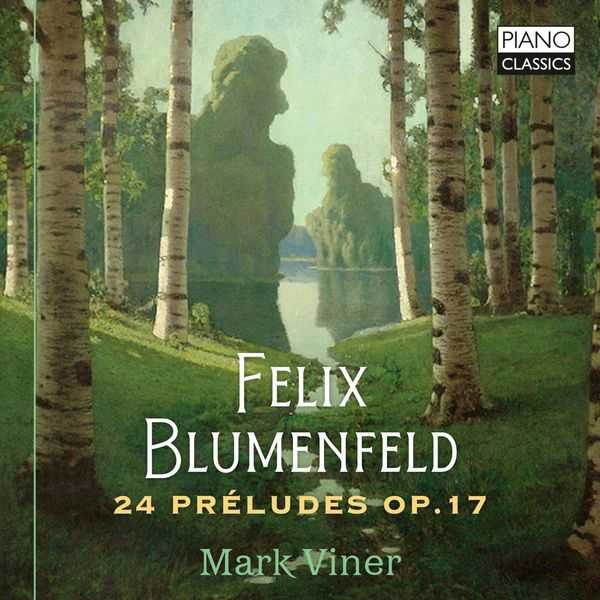

Composer: Felix Blumenfeld
Performer: Mark Viner
Format: FLAC (tracks)
Label: Piano Classics
Catalogue: PCL10213
Release: 2022
Size: 961 MB
Recovery: +3%
Scan: yes
24 Préludes, Op. 17
Cahier I
01. I. Andante Religioso
02. II. Allegro Agitato
03. III. Allegretto
04. IV. Andante
05. V. Allegretto
06. VI. Allegro Molto
Cahier II
07. VII. Allegro Vivo
08. VIII. Allegro Vivo
09. IX. Maestoso
10. X. Andante
11. XI. Andante con Moto
12. XII. Presto
Cahier III
13. XIII. Andantino
14. XIV. Andante maestoso e Lugubre
15. XV. Allegro non Tanto
16. XVI. Adagio
17. XVII. Allegro
18. XVIII. Memento mori. Andante
Cahier IV
19. XIX. Andante
20. XX. Allegro Furioso
21. XXI. Andante Tranquillo
22. XXII. Allegro
23. XXIII. Allegro
24. XXIV. Presto
25. Etude pour la main gauche seule, Op. 36
26. Etude de concert, Op. 24
Felix Blumenfeld (1863-1931) was a virtuoso pianist, conductor and teacher whose class comprised the likes of Simon Barere, Maria Grinberg and Vladimir Horowitz. But he was also a composer of an oeuvre of breathtaking beauty, originality and sophistication.
Blumenfeld was born in the Ukraine, into a family of Austrian-Jewish and Polish origins (his mother was a cousin of the composer Karol Szymanowski, whereas the famous pianist and pedagogue Heinrich Neuhaus was his nephew). He was in close contact with the musical giants of his age: Tchaikovsky, Glazunov, Borodin and Lyadov. Like many composers of the so called Silver Age, the majority of Blumenfeld’s compositions are for the piano. His music is rooted in the late Russian Romantic tradition in which a national voice can be heard, while the pianistic writing is undeniably inspired by Chopin, though also the influence of other composers such as Adolf von Henselt and Franz Liszt may be traced. Much of his output also shows the influence of Wagner in its bold chromaticism.
Rimsky-Korsakov exercised the most formative influence on the young Blumenfeld, introducing him to fellow Silver-Age composers and to the influential publisher Belaieff, who recognised the young pianist’s talent and then issued many of his works.
Even in his mid 20s Blumenfeld began teaching at the St. Petersburg Conservatoire but resigned in protest at Rimsky-Korsakov’s dismissal following the senior composer’s support of the protestors killed in the Bloody Sunday massacre of 1905. At length he returned to his post but left for Kyiv on the outbreak of the Russian revolution, and became rector of the conservatoire founded by Mykola Lysenko (where he taught Horowitz).
Chopin, Wagner and other Romantic-era masters all make their presence felt in the surging melodies and passionate harmonies of Blumenfeld’s own music. Published in 1892 by Belaieff and dedicated to Rimsky-Korsakov’s wife, the Op. 17 form a quintessential work of Slavic late Romanticism. They are structured in four books of six preludes, touched with the solemnity of Orthodox chant at points and often aspiring to a grand and tragic idiom despite their relative brevity and tending towards melancholy even in the major-key pieces.
The Op. 17 Preludes are complemented in this new recording by Blumenfeld’s Study for the left hand, Op. 36 – relatively familiar as an example of the technique and widely promoted by the likes of Godowsky and Lewenthal. The Op. 24 Etude de concert is a dazzling accumulation of piano sonority requiring the deftest of hands and care over voicing to bring its towering chords to life. The 24 Preludes, Op. 17 are clearly modeled on Chopin’s Op. 28. While much of the pianism is Chopinesque, it is often expanded upon, with technical devices taken further, while the music itself is undeniably Russian in its adoption of folk song and orientalism.